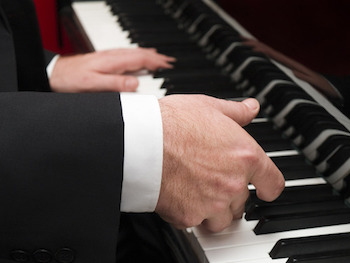The last time a piano technician came into your home to tune your piano, did you hear him mention your piano keys may need rebushing? What are properly bushed keys? And why is it important to the overall playability of your piano?
Properly bushed keys provide the foundation for accurate key leveling and spacing, and create a more solid and secure feel to the action of the keyboard.
Each key on a piano is held in place by two pins. The balance rail pin is near the center of the length of the key, and the front rail pin is at the front. There is a hole near both sections in which the rail pins fit into place. Each of these holes is bushed with a thin layer of felt.
When the piano is new, the bushings are loose enough to allow the key to move freely up and down, yet tight enough so that the keys don’t slip back and forth.
With a lot of play and repetition, the felt bushings become worn and compressed. You may start to feel the wiggle from side to side as you play, and may even knock together with neighboring keys. As a long time player, this can be more than a little disconcerting. But to a new player, this can eliminate the desire to play.
There is a proper way to fix worn key bushings and replace them altogether. This must be done with precision, as the work is delicate and misplaced bushings can drastically impact the sound of the piano.
Each felt bushing must be steamed and lifted out.
Next, the right thickness of felt must be created to assure a proper fit. The felt is held in place with special cauls and hot hide glue, while the edges are carefully trimmed to prevent them from poking up and disturbing the fit of the key.
After the glue is dried, the cauls are removed and keys are put back into place. If the rebushing was performed correctly, little adjustment is needed to get the piano back into proper working order.
Have a question about the playability of your piano? Give us a call today.

